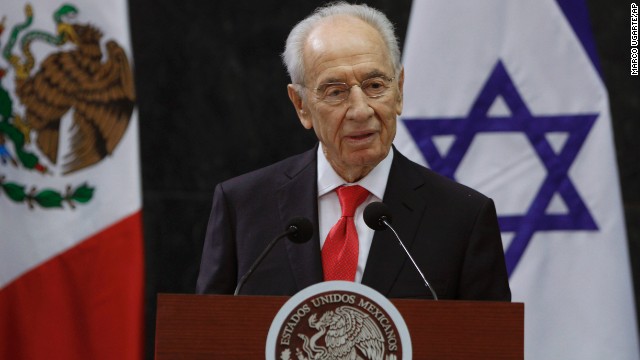NOVANEWS
Israeli President Peres on meeting Iranian President Rouhani: Why not?

Tel Aviv, Israel (CNN) — Israeli President Shimon Peres said Sunday that he could be willing to meet with Iranian President Hassan Rouhani, but expressed wariness of other forces in the country.
“Why not? I don’t have enemies,” he told CNN’s Richard Quest at a business conference in Tel Aviv, when asked whether he’d be willing to have such a meeting.
“It’s not a matter of a person but of a policy,” Peres added. “The purpose is to convert enemies into friends. If it was only him I’d take it with greater assurance, but there are other structures, other people. The Iranian Revolutionary Guard, half army and half organization, spreads terror all over the world. And I’m not so sure they support the president. We have to see the balance of the situation.”
Peres reiterated Israel’s position that it won’t stand for Iran being a “nuclear danger” to the world, and that “all options remain on the table to give weight to the words.”

But Israel prefers a diplomatic solution, he said.
The Israeli presidency is largely a figurehead position. Prime Minister Benjamin Netanyahu leads the government. In Iran, Supreme Leader Ayatollah Ali Khamenei is in charge of the government.
After Iran deal, Obama and Kerry pivot to Middle East peace
U.S. Secretary of State John Kerry met with Netanyahu late last week. It was the first face-to-face meeting of U.S. and Israeli officials since the U.S. and five other world powers reached a six-month deal with Iran last month over its nuclear program.
Even though it’s only a short-term agreement, world leaders hope it will pave the way to a long-term guarantee that Iran won’t produce nuclear weapons. Iran insists its nuclear program is for civilian energy purposes, not weaponry. And Tehran hopes to recoup some of the billions of dollars it’s lost as a result of international sanctions.
Netanyahu wants to eliminate Iran’s nuclear capability entirely, rather than merely suspend and limit the country’s nuclear development.
“The problem is what will happen in the coming six months. It’s a trial period,” Peres said Sunday. “President Obama said that for him also this is a trial and gave an estimate of 50-50 as to whether it will succeed.”
Iran will not dismantle any of its nuclear facilities as part of an effort to reach a long-term agreement, Rouhani said in an interview published Friday in The Financial Times.
Asked whether dismantling Iran’s nuclear facilities was a “red line,” Rouhani said: “100 percent.”
Rouhani told the UK-based newspaper that the nuclear agreement hammered out in Geneva, Switzerland, is an important first step to see if a mutual trust can be built with the United States.
“The problems created over 35 years cannot be resolved over a limited time. The best test to see whether we are capable of building trust or not is this nuclear issue,” he said.
Rouhani, widely considered more moderate than his predecessor, Mahmoud Ahmadinejad, has struck a positive tone and reached out to the West to improve relations, particularly with the United States. He has also acknowledged the Holocaust, unlike Ahmadinejad. And Rouhani recently wished Jews a happy Rosh Hashanah through his official Twitter account.



